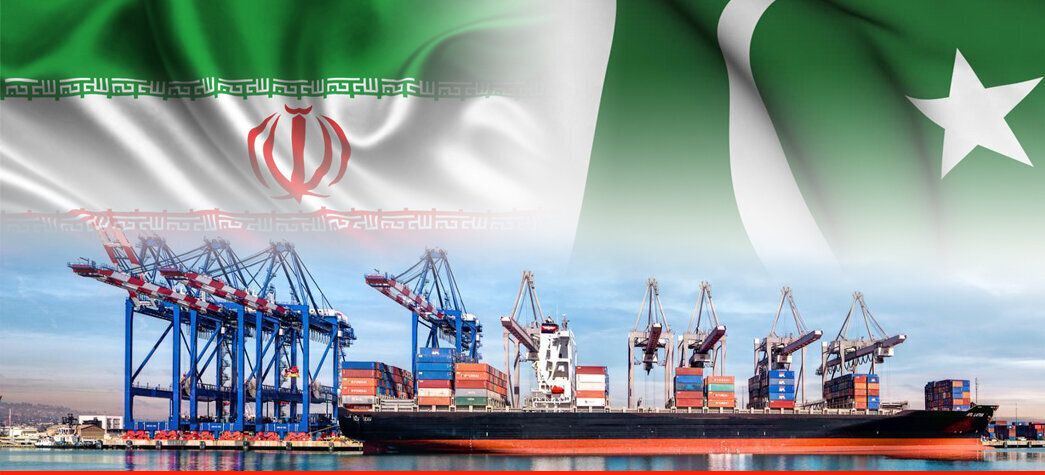Iran exports non-oil goods worth $1.2b to Pakistan in 7 months

TEHRAN- Iran has exported non-oil commodities valued at $1.2 billion to Pakistan in the first seven months of the current Iranian calendar year (March 20-October 21), the former head of the Islamic Republic of Iran Customs Administration (IRICA) announced.
Mohammad Rezvanifar said that Pakistan was the sixth top export destination of the Iranian non-oil goods in the mentioned seven-month period.
On November 5, Iran's Industry, Mining, and Trade Minister Mohammad Atabak said a free trade agreement with Pakistan has been finalized and the list of commodity items subject to the agreement will be prepared and released in two months.
In a meeting between the Head of the Iran Chamber of Commerce, Industries, Mines, and Agriculture (ICCIMA) Samad Hassanzadeh and Pakistani Ambassador to Iran Muhammad Mudassir Tipu in Tehran in late June, the officials stressed the need for Iran and Pakistan to exercise barter trade and free trade to materialize a $10 billion trade target.
During a meeting between Atabak and Pakistan’s Federal Minister for Commerce Jam Kamal Khan in mid-October, the two sides discussed trade ties between the two countries, with both agreeing that economic exchanges should be promoted further.
The two ministers met in Pakistan’s capital Islamabad on the sidelines of the 23rd meeting of the Council of Heads of Government of the Shanghai Cooperation Organization (SCO).
Atabak told IRNA that he and the Pakistani minister discussed trade ties between the two countries and agreed to hold further talks in order to explore ways to remove obstacles to the promotion of bilateral trade.
“Considering the historical and cultural commonalities of the two countries, we should take advantage of the strong potentials to expand trade exchanges between Iran and Pakistan,” the minister stated.
He also said that he invited Kamal Khan to visit the Islamic Republic.
According to the official, the necessary measures will be taken to prepare an agreement to be signed between the two countries during the visit of the Pakistani minister to Iran.
He stated that the current amount of trade exchanges between the two countries is not acceptable from the point of view of both Iran and Pakistan, and considering the strong relations and common links of the two countries, the two sides are confident that they will be able to increase the volume of trade exchanges several times.
The Pakistani minister spoke with IRNA as well. He described his talks with the Iranian minister as constructive, and said that visiting Iran is on agenda of his plans.
“We had good talks with my Iranian counterpart and reached constructive agreements, and we believe that there are many remaining tasks that the two countries are determined to pursue,” he said.
In mid-July, the 11th meeting of the Joint Border Trade Committee of Iran and Pakistan opened in the southeastern Iranian city of Zahedan, where the two sides pursue the increase of bilateral trade to $10 billion per annum.
Pakistan's Ambassador to Iran Muhammad Mudassir Tipu, who attends the meeting online, announced that Iranian and Pakistani delegations are scheduled to discuss the mechanism to increase mutual trade.
The Islamic Republic of Iran's consul general in Quetta, Pakistan's consul general in Zahedan, and other senior officials of Sistan-Baluchestan province took part in the meeting.
Such joint meetings are held to pave the way for reviewing obstacles, removing barriers, and developing trade and economic relations between the two friendly and neighboring countries.
The two sides make the necessary coordination to help improve trade and economic ties, exchange economic delegations, organize joint exhibitions, attract bilateral investment, and establish joint industrial centers and retail markets.
The head of the Pakistani delegation to the 11th meeting of the Joint Border Trade Committee said that Islamabad strongly supports the development of joint markets and investment, which can increase the level of trust between the two nations.
Irfan Javed added that Pakistan also calls for cooperation in the field of transportation because it can affect the livelihood of the people who are living in border regions.
The deputy coordinator of economic affairs of Sistan-Baluchestan governor’s office said that Iran is keen on expanding trade exchanges with Pakistan.
Davoud Shahraki added that the relationship between the two countries is historic and long-standing.
Increasing non-oil exports to the neighboring countries is one of the major plans that the Iranian government has been pursuing in recent years.
Iran shares land or water borders with 15 countries namely UAE, Afghanistan, Armenia, Azerbaijan, Bahrain, Iraq, Kuwait, Kazakhstan, Oman, Pakistan, Qatar, Russia, Turkey, Turkmenistan, and Saudi Arabia.
As the former head of the Islamic Republic of Iran Customs Administration (IRICA) has announced, the value of Iran’s non-oil trade with its neighboring countries has increased 23 percent in the first seven months of the current Iranian calendar year, as compared to the same period of time in the past year.
Mohammad Rezvanifar has put Iran’s non-oil trade with its neighbors at 64.5 million tons worth $41.1 billion in the seven-month period.
He said trade with the neighbors also increased by 16 percent in terms of weight.
According to Rezvanifar, Iran exported 51.1 million tons of non-oil goods worth $20.2 billion to the neighboring countries in the seven-month period of this year, while importing 13.4 million tons of goods valued at $20.9 billion.
Regarding Iran's main export destinations among the neighboring countries, he said: “Iraq, the UAE, Turkey, Afghanistan and Pakistan were the five main export destinations of Iran among the neighboring countries.”
“United Arab Emirates, Turkey, Russia, Oman, and Pakistan were the five major sources of imports among the neighboring countries in the seven months of this year,” the official added.
MA
